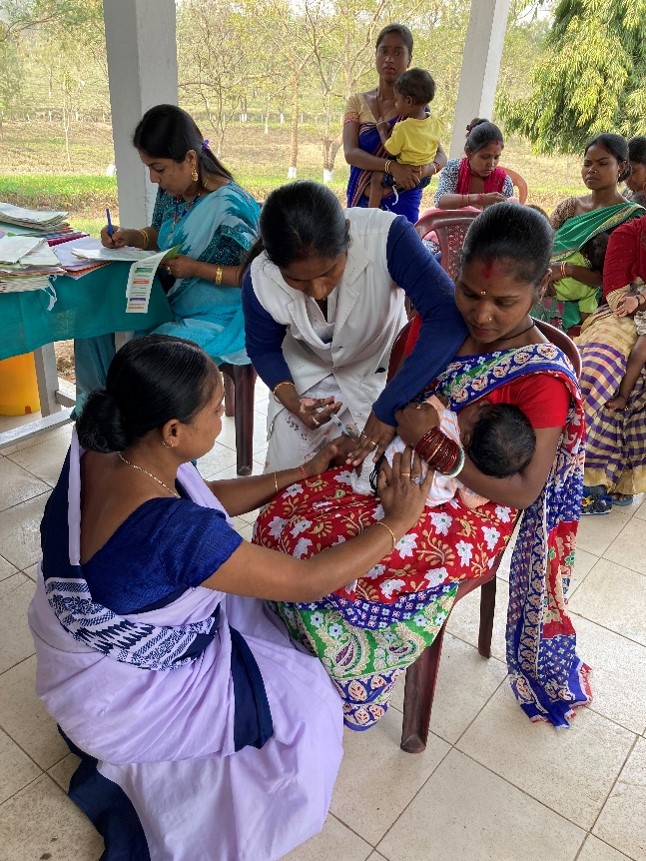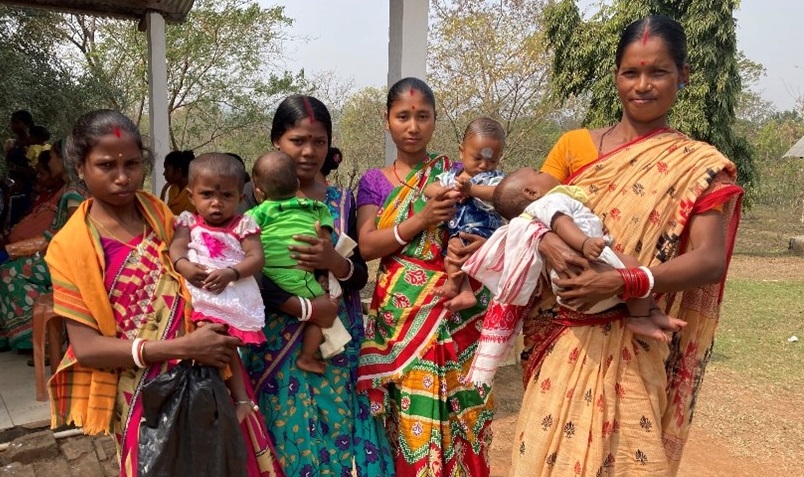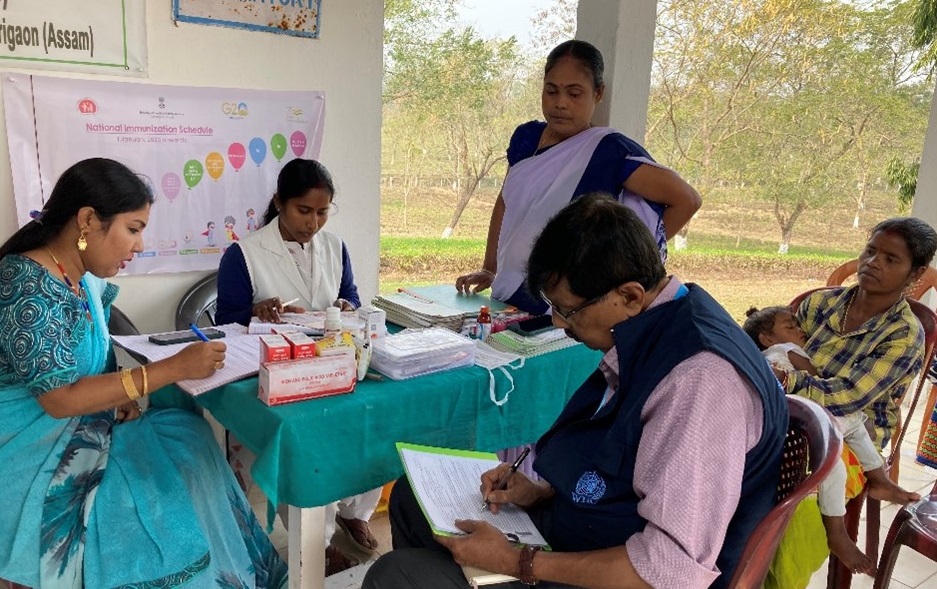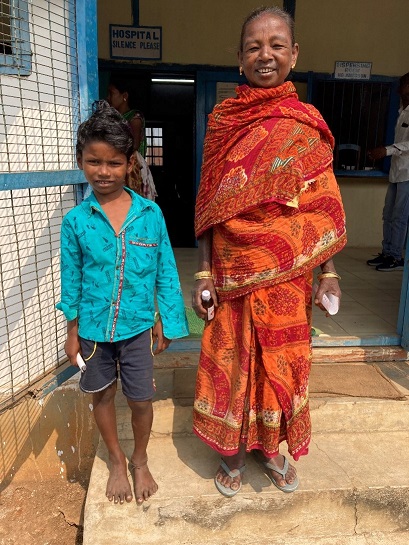Three-months-old Ms Anu Mirda is among the over two dozen babies and children getting vaccinated at the picturesque Gopal Krishna Tea Estate Hospital in Killing river valley in the Morigaon district of Assam. Most of women waiting to get their children immunized live and work in the 425-acres tea estate and belong to the “Tea Tribes” of Assam. Tea Tribes are a multi-ethnic community of tea-estate workers who are originally from Odisha, Madhya Pradesh, Bihar, Andhra Pradesh and West Bengal but have been living in Assam for several generations. The Gopal Krishna Tea Estate has 651 permanent workers and is home to more than 2200 persons.

ASHA worker Ms Nomita Paharia assists ANM Ms Anamika Das vaccinate three-months-old baby Ms Anu Mirda in the arms of her mother Ms Morimi Mirda (Photo: Sanchita Sharma / © WHO India)
The immunization session at the hospital is between 10 a.m. and 2 p.m., but the steady stream of mothers arriving with their babies continues till late afternoon. Ms Anamika Das, the ANM paid by the tea estate management and trained by the Government of Assam, works efficiently. “There are 16 children on the ‘Due List’ (children due for vaccination under the universal immunization programme) for today, but mothers whose children have missed vaccination doses are also here. Some more will come later, we wait longer for women who come from work. Everyone who comes here today will get vaccinated,” says Ms Das, who maintains a meticulous record of each newborn’s health and weight status from the third day from birth to up to 42 weeks. She routinely shares the data with the Block Primary Health Centre for review and digitization.

Mothers patiently wait for their turn to get their babies vaccinated at Gopal Krishna Tea Estate Hospital in Morigaon district, Assam (Photo: Sanchita Sharma / © WHO India)
“This hospital is part of the Government of Assam’s PPP with Tea Garden Hospitals to strengthen primary health care services, including routine vaccination and ante- and post-natal care closer to where people live. Under the scheme, National Health Mission Assam provides support in the form of essential drugs, doctors, ANMs (Auxiliary Nurse Midwife) and ASHAs (community health volunteers), including trainings, and financial assistance to procure new equipment and renovate existing infrastructure. The goal is to reduce zero-dose children and ensure no child or mother is missed,” says Dr Niranjan Konwar, District Immunization Officer In-charge, Morigaon, Assam. Housed in a pre-Independence British bungalow, the Gopal Krishna Tea Estate Hospital was recently expanded to add a maternity ward with four beds, a labour room and a baby-warmer.
 WHO Surveillance Medical Officer Dr Arup K. Deka monitoring routine immunization activities at Gopal Krishna Tea Estate Hospital (Photo: Sanchita Sharma / © WHO India)
WHO Surveillance Medical Officer Dr Arup K. Deka monitoring routine immunization activities at Gopal Krishna Tea Estate Hospital (Photo: Sanchita Sharma / © WHO India)
Ms Padma Sri has brought her one and half months-old daughter Nirmala for the first dose of Pentavalent vaccine, which provides protection to children from five life-threatening diseases – diphtheria, pertussis, tetanus, hepatitis B and Hib (Haemophilus influenzae type b). Ms Sri was reminded about the routine immunization day by ASHA Nomita Paharia. “There is no vaccine hesitancy here, families know the value of vaccination and good health,” said Ms Paharia.
The WHO National Public Support Network is providing technical and surveillance support to the Government of Assam to bring down zero-dose children, improve full immunization coverage, enhance school immunization plans, and boost immunization coverage in urban, underserved and hard-to-reach areas.

Ms Surjumuni Murmu and her grandson Angad regularly visit the hospital for treatment and care (Photo: Sanchita Sharma / © WHO India)
Ms Surjumuni Murmu is at the hospital with symptoms of tiredness and drowsiness. Her lab results show her haemoglobin is critically low at 6 mg/dL. Dr Mohit Dekaraja, a government medical officer who visits the tea estate hospital on weekdays, prescribes iron supplementation and nutritional advice. “Malaria has declined, but worm infestation, anaemia and TB remain a problem. We have 10 TB cases here, two are cured but eight – seven men and one woman – are still on DOTS (directly observed treatment shortcourse). Regular follow-ups are done, including giving nutritional packages, screening all household contacts for active TB, and giving them preventive treatment if TB is ruled out. We are supported by Morigaon Civil Hospital and Morigaon District Health Administration,” says Dr Mohit Dekaraja, medical officer, who has been vising the tea estate hospital for 2-3 hours a day since May 2022 at the request of the tea estate management.
The availability of quality services and community outreach initiatives, such as for TB and routine immunization, has built trust and led to high health-seeking behaviour. “There is no vaccine hesitancy here, people keep asking the ASHA when they can bring their children to get vaccinated,” says Ms Yearunessa Khatun, ASHA supervisor of 12 villages in Morigaon district.
